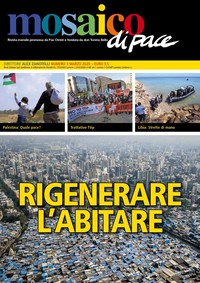The Many Paths To Peace
“Blessed are the peacemakers, for they shall be called children of God” – Matt. 5:9
At the beginning of the New Year 2017, I wish to offer some words of exhortation to all Nigerians on the need for all of us to be active co-workers of peace in our nation. Peace is a great blessing for humanity. Without it, there is hardly any room for progress. It is a great gift from God Himself. Men often say that they are seeking peace, but they act in many ways against peace. It therefore continues to be elusive. “Peace be with you”, says Jesus Christ to his followers, but not as the world gives it. The path of Christ is the only sure way, through love, forgiveness and active non-violence. Just as there are many ways of endangering peace, so also are there many paths to build and sustain it. It used to be said: “If you want peace, prepare for war.” This is the logic of enforcing peace by force of arms, the logic behind the scandalous arms build up, huge national armies and non-state combatants of all kinds, huge defense budgets in the midst of poverty. Prepare for war, and you will get war. It becomes the survival of the fittest, the victory of the more powerful, not of the righteous, unjust peace, silence of the weak, triumph of the powerful. This is what has taken humanity into many wars, which are even now still going on.
It is in this regard that Pope Paul VI, in the 1960s, challenged the world to take another path – the path of justice. He said: “If you want peace, work for justice”, for the development of the whole man and of all men. Blatant injustice and inequalities in the world build up social tensions, eventually leading to the break down of the unjust structures abhorred by nature. Greater justice and sharing between and within nations create a more conducive environment for peace to reign in a sustainable way. The famous “Sustainable Development Goals” of the United Nations are therefore steps in the right direction.
But since absolute justice is hardly achievable in our human society, we need to go beyond justice to ensure solid and durable peace. Pope John Paul II tells us: “If you want peace, be ready to generously offer and humbly accept mutual forgiveness.” Suffering some measure of injustice and injury for the sake of peace, forgiveness leading to reconciliation. Without forgiveness, there can be no peace and reconciliation. Pope Francis teaches the same lesson in terms of mercy, which is another name for forgiveness. Here, we have to go beyond ourselves and draw strength from God. It is well said that, “to err is human and to forgive is divine”. God, the author of mercy and forgiveness is the only true and lasting foundation of peace and reconciliation among men.
These are not just abstract theological speculations. They are applicable to the realities of our daily life. Permit me to apply these ideas to two very current and concrete national issues.
On Security and Boko Haram, with effective and commendable armed response, our soldiers have “technically defeated” Boko Haram, and routed them from their strongholds in the Sambisa forest. But much still needs to be done to achieve full and durable peace that will enable people to return in security to their homes and villages. Two areas come to mind here: massive program of social development and justice in the North East zone. Rather than aiming at “killing them all off”, can we not develop a deliberate program of reaching out to ex-combatants of Boko Haram, with amnesty and re-integration? This is certainly a risk that is worth taking, for the sake of the many who may actually be waiting for such an opportunity.
On the war against corruption, can we go beyond public denunciations and arraignment before sensational tribunals? Can there be offer of channels for quiet repentance, refunds and amnesty? This is more likely to be effective, especially for repatriating funds lodged in foreign banks. The endemic corruption that we have seen may have sucked in many decent people with no real intention to steal public funds. Already, we hear that Mr. President is applying this system quietly with some of his friends. This should be made an open policy available to everyone with good intention. Those who refuse to avail themselves of such an opportunity for “amnesty” should be pursued, prosecuted according to law, and if found guilty, made to face the full wrath of the law.
In my brief acceptance speech when I received the Pax Christi International Peace Award in Brussels, Belgium, in October 2012, I spoke to the international audience about the situation of peace in Nigeria and my convictions in pursuing the work of peace. Among other things, I said that, “One conviction which I have consistently found valid is that the vast majority of people in Nigeria are normal persons like me. In situations of conflict, there is often a large silent majority which only wants to go about their lives in peace, but which often gets drafted into taking belligerent positions by a vocal dangerous minority with extremist agenda. The challenge is to build on the foundation of the goodwill of the majority, get the silent majority to abandon its silence and speak out and put together a vocal critical mass of peacemakers.”
I know that the way to peace can be long and tortuous. But it is nevertheless a necessary way to go if our country is to avoid destroying itself. As we make our feeble efforts, we are encouraged to know that this is the direction that God himself is leading our country, to his kingdom of justice, love and peace. There are many paths to peace and justice. We should leave no stone unturned to turn our nation around.
– Onaiyekan is the Roman Catholic Cardinal Archbishop of Abuja and International Moderator of World Council of Religious Leaders – Religions for Peace.





